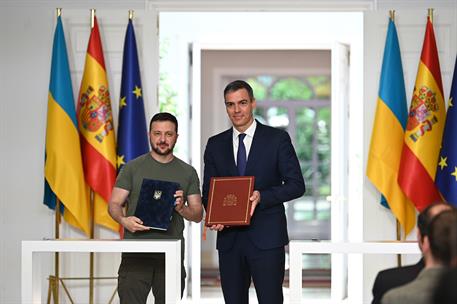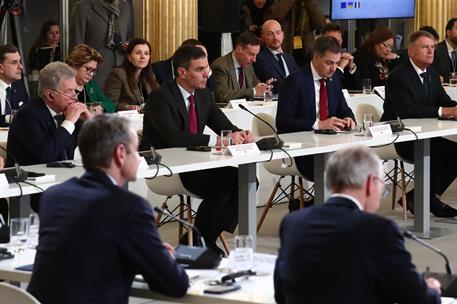The President of the Government of Spain took part in the Summit on Peace in Ukraine
Pedro Sánchez: "It is time for us to achieve the just and lasting peace that Ukraine and the world deserve"
President's News - 2024.6.16
The President of the Government of Spain, Pedro Sánchez, upon his arrival at the Peace Summit in Ukraine | Pool Moncloa/Jorge Villar - 2024.6.15
Lucerne, Swiss
The President of the Government of Spain, Pedro Sánchez, attended the Summit on Peace in Ukraine, held on 15 and 16 June in the Swiss city of Lucerne. It was organised by the country's authorities with the aim of initiating a process leading to a just and lasting peace based on international law and the UN Charter.
For the first time in two years since Russia's aggression against Ukraine, the international community, represented by more than 90 countries, 57 of them represented at the level of heads of state or government, has come together to seek peace. The aim of this summit was to stimulate a future peace process and to identify the consensus on which to build and move towards such a process.
At this first meeting, they discussed three issues of concern to the countries and on which there is the greatest consensus: nuclear security, food security and the humanitarian dimension of the conflict.
The President of the Government of Spain underlined the importance of respect for a rules-based international order: "If we do not act according to these rules and do not defend them vigorously, there is no international order". In this respect, he added that "we are united around fundamental values" such as respect for the sovereignty, independence and territorial integrity of each and every country. These principles "are non-negotiable", Sánchez said. Therefore, any solution that validates aggression or violent annexation "will not be sustainable".
Spain's commitment to Ukraine will continue "for as long as necessary", the president of the Government of Spain reiterated. This commitment was renewed and strengthened through the recently signed bilateral security agreement with Ukraine.
Spain was also one of the countries that signed the Joint Declaration of the Summit, which laid the foundations for the main consensus to continue working towards a peace process that ultimately also includes Russia.
Family photo of the Summit on Peace in Ukraine | Pool Moncloa/Borja Puig de la Bellacasa
Global food security
The President of the Government of Spain took part, together with other world leaders, in the working group on food security: "Food is not a weapon," Sanchez explained.
Some of the global consequences of this conflict are the terrible humanitarian crisis, the worsening of the pre-existing global food crisis and the fear of a nuclear catastrophe. Therefore, different panels have been held on these issues to address possible global solutions.
Nearly 282 million people in 59 countries and territories experienced high levels of acute hunger in 2023, a global increase of 24 million from the previous year. For four consecutive years, the proportion of people facing acute food insecurity has remained persistently high, significantly exceeding pre-pandemic levels. Russia's aggression against Ukraine has aggravated the global food insecurity crisis.
In this regard, Spain has been actively engaged, with policies and resources, in trying to mitigate the impact and consequences of this crisis. It has done so by making various contributions: 236.5 million euros over three years for Official Development Assistance; 14.4 million euros for the Emergency Food Impact Plan; 100 million euros in guarantees from the European Bank for Reconstruction and Development (EBRD) to assist Ukrainian municipalities and protect food security; and 2.3 million euros to the Global Crisis Response Group on Food, Energy and Finance through the United Nations Conference on Trade and Development (UNCTAD). In addition, in the period between 2021 and 2023, Spain chaired the United Nations Committee on World Food Security.
Spain will also host the fourth International Conference on Financing for Development next year, which represents an excellent opportunity to address the mobilisation of resources needed to end hunger and malnutrition through a just transition of the food system.
Non official translation







